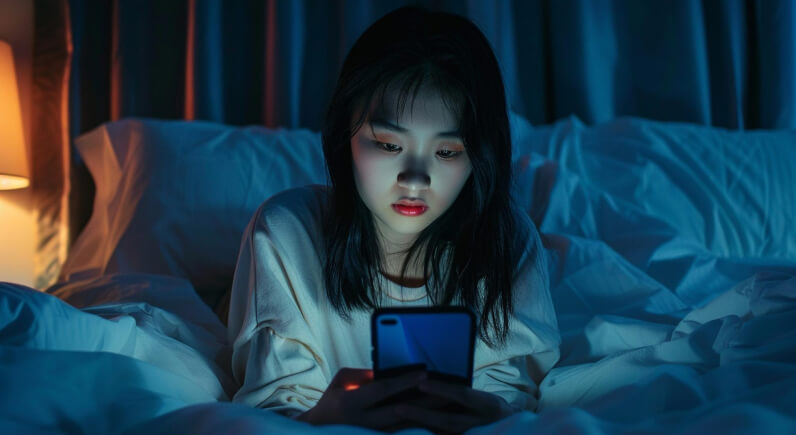The impact of screen time on sleep and how to reduce the impact

In this digital age, screens are everywhere—from the smartphones in our hands, to the laptops at our desks, and the TVs in our living rooms. While technology brings many benefits, it also introduces significant challenges, especially when it comes to sleep. If you find yourself tossing and turning throughout the night, your screen may be the culprit. This post discusses the effects of screen time on your sleep, and offers helpful tips for minimizing those effects.
Understand the impact of screen time on sleep
Destroying melatonin production with blue light
Blue light is a type of light emitted from screens that can disrupt the body's production of melatonin, a hormone that plays a role in regulating sleep-wake cycles. When you use your devices in the evening, the blue light tricks your brain into thinking it's still daytime, lowering your melatonin levels and making it harder to fall asleep.
The psychological effects of screen time
In addition to the physical effects, screens can overstimulate your mind. Engaging in social media, watching an exciting movie, or even working late can keep your brain awake. This mental stimulation can make it harder to relax and lengthen the time it takes to fall asleep.
Problem assessment

Shocking statistics and research
Several studies have highlighted the increasing disruption to sleep caused by screen time, particularly among younger people. For example, a study from the National Sleep Foundation found that 90% of people use some form of technology within an hour of bedtime, and this behavior is clearly linked to poorer quality sleep. Another study published in the journal "Pediatrics" found that children who spend more time in front of screens are more likely to experience sleep problems, such as shorter sleep durations and longer sleep periods.
Prevalence among children and adolescents
Children and teens are at high risk for the adverse effects of screen use on their sleep. With online learning and gaming on the rise, many are spending hours in front of screens every day. The American Academy of Pediatrics reports that children ages 8 to 18 spend an average of 7.5 hours per day using entertainment media, significantly impacting their sleep health.
Helpful tips for reducing the impact of screen time on sleep

Setting boundaries and scheduling digital media use
An effective way to reduce the effects of screen time is to set limits. Set a time limit for digital use by turning off all screens at least an hour before bed. This gives your body time to adjust and naturally produce melatonin.
Using blue light filters and blue light blocking glasses
Many devices today have built-in blue light filters, often called "night modes" or "blue light reduction." Blue light blocking glasses are also a worthwhile investment. These glasses filter out blue light, reducing its impact on your sleep.
Promoting an alternative bedtime routine
Instead of scrolling through your phone or binge-watching TV shows, try adopting an alternative bedtime routine. Reading, meditating, or doing gentle stretches can help you relax and prepare for sleep without being exposed to the negative effects of blue light.
Tools and resources
Apps and devices to track and reduce screen time
There are several apps and devices that can help you track and reduce your screen time. Apps like "Screen Time" for iOS and "Digital Wellbeing" for Android provide insights into your screen time and allow you to set limits. Other tools, like "f.lux," adjust the color temperature of your screen based on the time of day, reducing your exposure to blue light in the evening.
Conclusion
Managing your screen time is important for better sleep and overall well-being. By understanding the impact of screens on your sleep and implementing helpful tips to reduce those impacts, you can enjoy more restful sleep and more productive days. We invite you to share your experiences and tips in the comments below. Don't forget to share this post with friends and family who might also benefit from these tips.




















